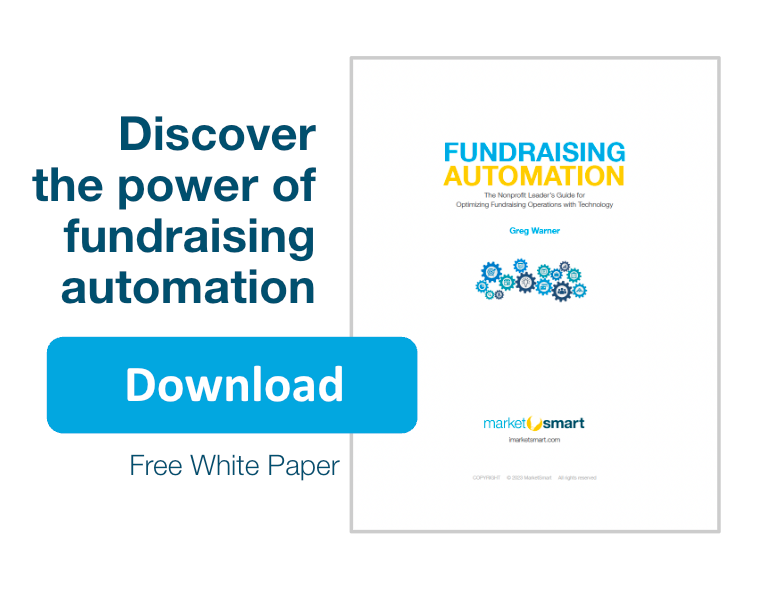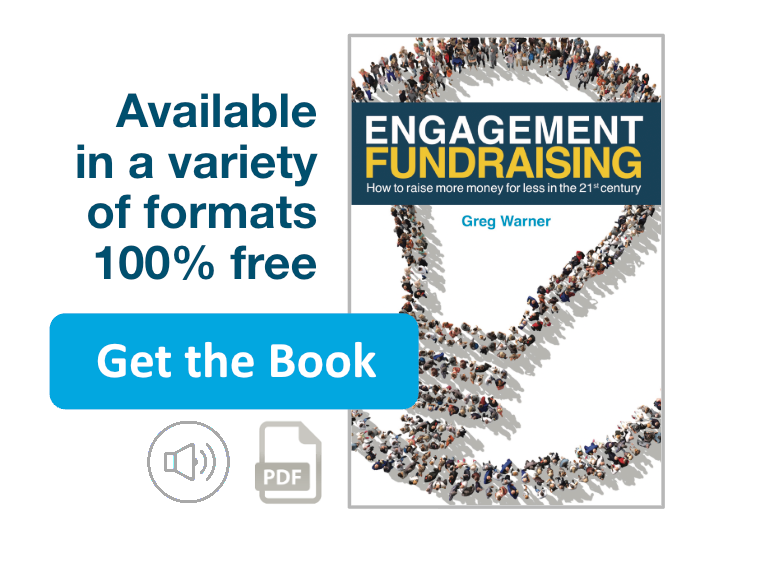When it comes to ‘how to ask for a gift,’ you’ll see there’s a parallel between how we conduct sales here at MarketSmart and how nonprofits should raise funds.
First, please know this: At MarketSmart, we don’t close sales and we don’t close deals. Rather, the deals close themselves because our clients sell themselves after we engage them properly.
Furthermore, we don’t have sales people and we don’t pay anyone a commission.
Instead, we have Solutionists. Solutionists listen and help prospects (and clients) understand how our products and services can help solve their problems and reduce their “pains”. Our Solutionists help them decide whether or not they should buy from us. There’s no pressure— ever.
But we DO, however, provide our prospects and clients with options. We DO show them a menu of proposed solutions. We DO offer them opportunities to make a decision. We DO ask them when they think they will make a decision. We DO follow-up with them based on their requests. We DO (sometimes) include a deadline to help provide them with a sense of urgency. And, we do, sometimes, straight-up ask for the order.
Why am I telling you all of this?
Because I think the days are over when a salesperson nervously looked a prospect in the eye, asked for the order, pressured and cajoled a bit, and then closed the deal.
Yes, sometimes our Solutionists come out and just ask. But most of our clients don’t need that final nudge. Most of them close their own deals for us. Most of them ask us for a contract so they can sign it right away.
So what about fundraising? What about asking for donations? Do you really have to “make an ask” these days?
When I say no to a fundraiser’s request, it’s usually because I’m not ready. I haven’t been properly educated, informed or counseled. Their timing is usually way off and I feel they should have a sense of that. If they are true professionals, I tend to feel that they should know better.
Now, having said that…
I can see “making an ask” when you need a lead gift for a capital campaign. Of course by then you’ve probably already built a solid relationship with a very wealthy person who believes in your mission. Someone with confidence in your organization’s leadership and staff. Sure. Go ahead. Make that ask! It will make sense to that supporter.
But for the other major donor who gave $10,000 last year, do you really have to make a high-stakes ask?
Shouldn’t you simply engage and involve them all year long in ways that make them feel good and help them understand the problem(s) enough so they will ask themselves?
And, when you visit them, shouldn’t you simply let them know that you want to help them navigate through a variety of solutions they might want to consider supporting? And, shouldn’t they, sometimes be offered the opportunity to maneuver through those solutions on their own (conveniently online in the privacy of their own homes)?
What I’m saying is this:
I think if you do everything right online and offline…
If you thank your supporters, show them that you appreciate them, recognize them…
If you show them what you did with their money last time they gave…
And, if you provide them with offers to engage and involve themselves more deeply with your mission…
won’t many of them give on their own and trip over themselves to give after you’ve laid out a handful of giving opportunities?
I think they will.
Then, they’ll also cry tears of joy while thanking you profusely for giving them the opportunity to help make the world a better place.
So you too, like our Solutionists, should provide your supporters with options. You should show them a menu of proposed solutions. You should offer them opportunities to make a decision. You should ask them when they think they will make a decision. You should follow-up with them appropriately based on their requests and timelines. You should consider including a deadline to help provide them with a sense of urgency. And, sometimes, YES! You should straight-up ask for the gift. But not because your organization needs the money. Rather, you should do it because first and foremost you know the supporter would benefit from such a straightforward nudge.
After all, fundraisers are facilitators.
Let’s be honest with ourselves and recognize that some supporters despise the word “fundraiser” as much as the word “salesperson.” Unfortunately, both words have been tainted because of unscrupulous practitioners in fundraising and sales who preceded all of us.
Let’s recognize that your supporters don’t want to be persuaded, pushed or pressured. No! They want to be engaged and involved. They want to collaborate with you. They want to participate. And, quite often, they can do all of that online at a time and place of their choosing. So they can feel good when they want to feel good— period! After all, that IS why people give… to feel good!
And, that’s precisely why coercion, cajolery, and coaxing won’t work. Those approaches simply make people feel bad.
Supporters want you to facilitate the giving process— not force it.
And besides, isn’t “making an ask” nerve-racking?
Too often it’s uncomfortable for both you and your supporter. Yet, it shouldn’t be.
However, you can avoid all the anxiety placed on both sides if you lay the proper groundwork in advance. If the relationship is solid. If the supporter has belief in the mission. If they have a close personal connection. If they have been involved. If they feel appreciated. If they have confidence in the leadership team and staff. If they see the value in their exchange of money for impact.
So why not empower your supporters with an online experience that helps to support all that? Why not let it support what you do just as the Air Force supports the boots on the ground?
If you do, many of your supporters will ask themselves to give and you’ll simply be facilitating the exchange. How to ask for a gift has drastically changed.
Related Posts
- How to be the Obi-Wan Kenobi of Fundraisers to Guide Your Donor’s Hero Journey
- The 10 Commandments of Engagement Fundraising
- 8 Ways to Ask for a Donation Without Actually Asking





We Planned Giving Officers regularly contend with administrators who attempt to measure our success with metrics designed for Major Gift Officers. One of those metrics is counting “Proposals.” I regularly need to explain that I do not submit proposals. I have ongoing discussions.
My experience helping to secure charitable gifts totaling many tens of millions of dollars has never included making “the ask.” I have found that if the prospect has a passion for the mission, all I have to do is properly explain the need. When the time is right, they will offer to help solve the need to the best of their ability.
Thanks for your perspective Steve. Hopefully, someday, the administrators will learn to trust professionals like you.
Well said! I couldn’t agree more. Often times, it is easy for an organization to view donors more as widgets or a means to an end than people. Greg’s article represents a fresh view of looking at the donor journey.
“Fundraisers are facilitators.” Word up. Love the way you think, Greg.
Greg,
Asking is still necessary to landing many larger gifts– even for programs. There are many people who make the assumption that if you don’t ask for the gift, you must not need it very much.
Without the ask, a generous donor intending to make a gift, will make a guess on what is needed. Many times the guess is lower than the amount needed. When all the while the caring and passionate donor may have gladly stretched his/her generosity to meet the need if only asked.
But even more important than this, I believe that there is something very special that happens to a relationship when asking for help is part of the dialogue. It is like the transaction is incomplete without the ask. To the donor, the ask is a way for building trust. If a gift officer asks for a large gift, that ask comes with the responsibility that if the gift is given, the money will be used as described in the request.
If a donor makes an unsolicited gift of $10,000, and repeats the gift every year for five years, then suddenly stops giving to the nonprofit in year six? Because asking had not been a tradition in the relationship with the donor, only receiving, it makes the ask to reactivate the donor much more challenging, and the gift unlikely.
Sure, with the advent and continued morphing of electronic media and online transacting, it makes it much easier and quicker for a donor to be moved by a call to action, then immediately respond with a generous gift. I love it when that happens! But I hate it when I consider all of the large gifts that may be missed, because gift officers didn’t care enough to ask for them.
One last comment about the idea of no longer having to ask for the gift…
As a gift officer ask the question, “Will my chances of getting the gift be diminished if I ask for it?” and…
“Is there a chance I may not get the gift if I do not ask for it?”
I think you will agree that the answers to these questions are “No” and “Yes” respectively.
Thanks Kevin. Good stuff!
The trick in asking is timing. Most nonprofit staff find it unnatural and uncomfortable to ‘ask’ because they are (correctly) sensing that the timing is off. That’s because organizational leaders (including board members) push them to solicit rather than engage, serve and facilitate.
My article’s headline was, of course, designed to attract attention. But the meat of the post is certainly not about ‘not asking’. It’s about providing offers that deliver value to the donor at times that make sense for everyone involved.
As a proud fundraiser, I completely disagree with the sentiment of this article. I agree with Kevin (above).
This article actually saddens me (and made me change my mind about learning more about MarketSmart) . I believe fundraising is a sacred and honorable profession. You are not a fundraiser if you do not ask for gifts. You can be part of fundraising with marketing, administration, and stewardship. However, you are a fundraiser in name only if you don’t ask for gifts.
I love asking for gifts. It brings me pure joy to connect donors with programs and causes they love! I’m actually giddy after every solicitation meeting. It is frustrating to see an organization perpetuating an unhealthy way of viewing fundraising based on a lack of industry knowledge. The evidence-based practice for fundraising is asking for 1) a specific amount for 2) a specific program. Period.
Thanks for your comment Shelly.
Please keep in mind, I never said that you should not ask for a gift, you should not ask for a specific amount and should not align interests with a specific program.
I said that you should not make it a ‘high-stakes’ ask when a donor isn’t ready, when a relationship is not at the right stage, when the donor’s interests have not been discovered, when they haven’t been engaged, involved, and cultivated properly.
I also said that the online channel is being used more and more by donors as they self-navigate the decision-making process.
Your decision to change your mind about MarketSmart is certainly up to you. However, we have hundreds of customers around the world and dozens of case studies proving that donors these days prefer to navigate most of the timeline involved in the decision-making process on their own at their convenience. They don’t like high-pressure asks when they haven’t yet had a chance to move themselves through the consideration process.
All this is also backed up by research which I’d be happy to share with you if you are interested.
Bottom line: I wonder if you might have misinterpreted my article. Read it again and see if you still feel the same. Perhaps if you do, you’ll agree that the best ‘asks’ work well when the donor is ready for it and it’s a collaboration, not a solicitation.
I reread the article and still respectfully disagree. I believe you need to specify the type of fundraising you are referring to (annual fund, mid-level, major gifts, planned gifts) in the article. Major gifts and planned gifts require solicitation. I have made many major gift solicitations during my first meeting with a donor and they are joyful to give and thankful for my boldness to ask for an organization they care about so much.
Ok, thanks. Yes. Let’s respectfully disagree.
I believe those that thank you are doing so because they are somehow ready for your solicitation. That’s good. Especially if you are somehow only soliciting people who are in that stage of the consideration process.
As a donor, I can tell you that I have had several fundraisers come into my office or my home and solicit me (and my wife) having not yet built a relationship, not listened to my needs, not aligned a funding offer with my interests, etc. and it’s downright offensive.
Your experience does not align with mine as a major donor or the experiences of so many of my friends and family members who get solicited absent the right timing. I’m surprised by your professed success but applaud it nonetheless. And, of course, only wish you more astounding success going forward. Your organization is certainly fortunate to have such a gifted fundraiser on-staff. I hope they show you the appreciation for your skills that you apparently deserve.
Thank you for the thoughtful dialogue. I’m saddened that you’ve had negative experiences with major gift fundraisers. I’m not at all surprised.
It is the job of a professional fundraiser to prepare the way properly for a solicitation meeting. I never ambush anyone when soliciting a gift. I explicitly let them know that I will be asking for a gift when setting up the meeting. At that point, they can politely decline the meeting. I believe this is in an important step that most fundraiser skip.
My job as a fundraiser is to also ask the right philanthropic questions in order to make an appropriate ask. I understand why you have the view you do about major gift fundraising based on your past experiences. However, I wouldn’t throw out traditional solicitation methods based off the poor etiquette of major gift fundraisers. In-person solicitation meetings are actually my favorite and what I look forward to the most. I love being able to ask on behalf of an organization that is doing amazing work.
I would love to hear more about your negative experiences, if possible. I understand that not all fundraisers are going to see their profession as a sacred and high calling and your experiences are probably a result of bad fundraising philosophy.
Your company is doing great work to increase donor love and improve donor relations. Thanks for adding your expertise to our field. I appreciate the dialogue.
Hi Shelly,
May I jump in?
I have been involved in “fundraising” on the planned giving side for 22 years. In a typical year, I have facilitated $10M in planned gifts, including deferred and current gifts. I have never done an ask. Ever. I think there’s a time and place for that, and probably more so when inviting current gifts. But I agree with Greg’s philosophy … that it’s more about building the relationship, sharing the vision, providing excellent service (before and after the gift), and then inviting the gift when the time is right. It’s more relational than transactional, at least in my mind.
I think you have some good points. And my guess is that you and Greg probably align in your thinking more than you realize.
Anyway, that’s just my two cents’ worth!
Scott… you da’ man! Thanks for these wise words and your loyalty as a MarketSmart customer. We really appreciate YOU!!
But Shelly, aren’t you tacitly agreeing with Greg when you say, “It is the job of a professional fundraiser to prepare the way properly for a solicitation meeting. I never ambush anyone when soliciting a gift. I explicitly let them know that I will be asking for a gift when setting up the meeting. At that point, they can politely decline the meeting. I believe this is in an important step that most fundraiser skip.”
Would you do that with a prospect for whom you only have a wealth rating, no known interaction with your organization, and only some tangential relationship to your nonprofit? I would guess not. You have some knowledge of the person, a record of their giving history and preferences, and (I would assert) at least a working knowledge of why they love you before you go in on a first-time visit and ask for a major gift. Otherwise, you’d be wasting your time and your nonprofit’s money. Despite the prospect taking a visit. If you truly DO make cold calls on prospects who haven’t been warmed at ALL to your cause, and experience any degree of success–I want to take your webinar!
Just as it is a tacit agreement when you say, “The evidence-based practice for fundraising is asking for 1) a specific amount for 2) a specific program. Period.” How do you know what those 2 elements are if you haven’t engaged your donors, gotten to know them, and found the kinds of things in which they would like to invest? Whether it’s face-to-face engagement, or more of a permission-based marketing style that Greg talks about, you, as a fundraiser, have to know your donors or you’re shooting blanks in the dark. (I’ve heard a lot of news about the NRA today. Probably why I used a shooting metaphor! I’ve never even held a gun, LOL!)
I believe it is our highest calling as fundraisers to truly be the conduit. The “facilitator” in Greg’s words, between the prospects greatest philanthropic urge, (his need to “love mankind”), and our organization’s ability to solve the world’s problems. Unless we truly know and engage our donors, I don’t know that we’re fulfilling our donors’ needs and maximizing their philanthropy. I’ve read his book (thanks for the free book, by the way!), and my impression is that much of the “warm up” is what Greg is preaching. He’s not saying eliminate in-person solicitations, but rather find out who your best prospects are by helping them to engage online and raise their hands. (It’s been over a year since I read the book. If I got this wrong–apologies!)
Reading the article and reading your response, coupled with over 20 years as an MGO makes me think you have more in common than you realize.
Thanks Gloria. Very thoughtful and wise.
On a Saturday years ago I was working on a presentation, “Lessons Learned. I emailed my good friend, the late Robert Sharpe, Jr for his thoughts. He shared this wisdom:
In my experience there are two types of fundraisers. There are those who believe donors want to give and set about to help them do what they would like to do with respect for them as a complex human being. Many donors would like to make gifts larger than they are making but just don’t think they can do it because of natural factors in play in their lives. Fortunately we have many tools to help them.
Then there are the fundraisers who believe that most donors don’t really want to give and they have to figure out how to get them to do something they really don’t want to do. They see the donors as “targets” and the process as linear starting with research and ending with a successful ask and a “closed” gift. All the recognition, all the tax benefits, all the peer pressure and “all the king’s men” may get them to give once but often not again.
Both methods can lead to success though the former approach leads to the greatest results over time in my experience. The people who grasp and internalize the fact that they must understand who their donors are, why they want to give and are able to then help them figure out what is best to give, when to give, and how, is the key to success.
While you may “close” gifts in some cases, it is more satisfying to do what you do at a birthday party when friends bring you gifts. You don’t “close” those gifts, you “open” them and you often get more than you ever imagined or hoped for.”
At this point in my career I have no interest in working any more with the second category of people – the “transactional closers.” Not that they are bad people and don’t raise money – sometimes large sums – they just start from a place that doesn’t lead to maximum results or fulfillment as a professional in the final analysis.
I have facilitated well over $100 million in gifts during my career, and I have never, ever asked for a gift.